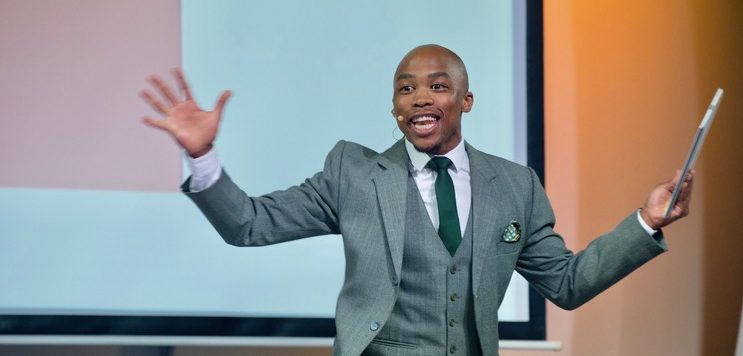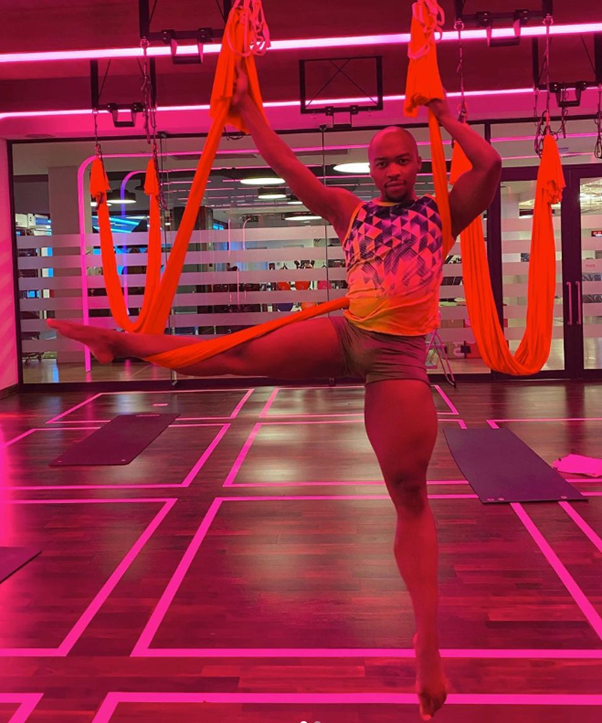Exclusive Interview with Itumeleng Malefetsa: Insights on Navigating the Job Market for African Graduates

Itumeleng Malefetsa is one of the well-known young motivational speakers in South Africa. Many people know him as an advisor to young graduates entering into a new era of employment.
In this exclusive interview, My Afrika Mag reporter Tapiwa Rubaya (TR) sits down with Itumeleng Malefetsa (IM) to discuss the challenges graduates face when trying to find work in Africa and around the globe amidst the high rate of unemployment. Itumeleng also outlines factors that have contributed to the increasing trend of young people choosing to pursue entrepreneurship.
TR: Itumeleng Malefetsa can you introduce yourself to our readers?
IM: Thank you, I’m a Business Developer and Resource Mobilisation Specialist, who embodies youthfulness, ambition, and a plethora of talents. With an unwavering commitment to success, I exude confidence in all that I pursue. I wear multiple hats as a Social Media Influencer, Model, Musician, Researcher, MC, Professional Dancer, Life and Career Coach, Brand Ambassador, Entrepreneur, Dance Fitness Instructor, and even hold the esteemed role of a Deacon.
Notably, I have achieved the remarkable feat of graduating twice in Transport Economics at the University of Johannesburg and currently pursuing my research in Philanthropy and Resource Mobilization with Wits Business School (WBS). I am very adventurous, enjoy travelling and a lover of life.
TR: You are a multi- talented person. Which of your many talents did you discover first – modelling, dancing/choreography, youth deaconry, motivational speaking, or research?
IM: Undoubtedly, my journey through the realms of passion has been predominantly fueled by my engagement in modelling and my proficiency in Latin and Ballroom dancing. These two distinct yet harmonious skills became an integral part of my life during my 11th-grade tenure in high school. My initiation into the realm of modelling was marked by a captivating debut in the pages of “Free4All,” a widely circulated newspaper catering to high school students across various institutions.
The resonance of this experience spurred my transition into modelling for the renowned “Life after School” magazine. As my modelling career flourished, I had the privilege of representing diverse clothing brands such as Diesel, Loxion Kulca, and Lee Copper, showcasing their creations with flair. Simultaneously, my journey in the world of dance commenced in the heart of Soweto, within the quaint confines of Diepkloof.
The vibrant rhythm of Latin and Ballroom dance captured my spirit, propelling me to embark on a competitive dance journey. Commencing at the beginner’s level, I persevered with unwavering determination, ascending the ranks to ultimately achieve the coveted championship level.
My dance odyssey evolved, encompassing an array of dance forms, from the expressive African rhythms to the refined elegance of ballet, contemporary, and classical dance. This multi-faceted training culminated in my participation in diverse dance productions and associations with esteemed dance companies.
My performances reverberated across the expanse of South Africa, imprinting the memories of my artistry in the hearts of audiences. Reflecting upon this remarkable voyage, it is evident that both modelling and dance have left an indelible mark on my journey hence what began as youthful pursuits have now evolved into defining aspects of my identity, woven intricately into the tapestry of my experiences.
TR: One might ask why you chose the path of being a youth motivator.
IM: I am fueled by a profound passion for nurturing the development and growth of young individuals. My ultimate aspiration is to witness the youth embracing positivity wholeheartedly and adopting an optimistic outlook on life. I am dedicated to steering them towards making well-informed choices regarding their career paths and life’s journey. Additionally, my fervor to impact and facilitate life-changing experiences is unmistakable—I take immense joy in making a tangible difference in people’s lives and witnessing the profound impact unfold.
TR: South Africa has a high rate of youth unemployment in Africa. Why are many young people not taking the entrepreneurship or self– employment route?

IM: South Africa’s high youth unemployment rate is a pressing issue that has significant social and economic implications. While some young people choose the path of self-employment as a response to limited formal job opportunities, it’s essential to recognize that not everyone opts for self-employment due to a variety of complex factors.
Some of the reasons why young individuals in South Africa choose self-employment and highlighting the diverse influences that shape their decisions include:
- Limited Access to Resources: One significant barrier to pursuing self-employment is the limited access to essential resources. Initiating a business venture requires capital, training, and mentorship, which are often out of reach for many young people. The lack of financial support and guidance can deter individuals from exploring entrepreneurial opportunities.
- Education and Skills Mismatch: The misalignment between the education and skills possessed by young people and the demands of the job market can undermine their confidence in pursuing self-employment. A mismatch between skills and market needs can lead to feelings of inadequacy and hinder the pursuit of entrepreneurial ventures.
- Social and Family Expectations: Societal and family expectations often play a pivotal role in shaping career choices. Traditional norms may prioritize stable formal employment over entrepreneurial pursuits, as the former is perceived as offering more security and stability.
- Lack of Role Models: The absence of visible entrepreneurial role models can contribute to the hesitancy to pursue self-employment. The lack of relatable success stories can lead young people to believe that entrepreneurship is unattainable or unrealistic.
- Regulatory Barriers: Navigating the regulatory landscape can be a significant challenge for aspiring entrepreneurs, particularly when lacking experience and resources. Regulatory complexities can be discouraging and hinder the pursuit of self-employment.
- Economic Climate: The overall economic conditions of a country can shape individuals’ willingness to undertake entrepreneurial ventures. Economic downturns or instability can discourage individuals from taking on the additional risks associated with self-employment.
- Mental and Emotional Factors: Entrepreneurship requires resilience and the ability to navigate uncertainty and setbacks. Some individuals may lack the mental and emotional fortitude needed to manage the challenges of running their own business.
- Cultural Norms: Cultural norms and values can influence attitudes toward entrepreneurship. If entrepreneurship is not highly regarded or doesn’t align with prevailing cultural values, individuals may be more inclined to seek other paths.
Addressing the issue of youth unemployment in South Africa requires a multifaceted approach that encompasses education reform, skills development, access to resources, policy changes, and efforts to create an environment conducive to both formal employment and entrepreneurial endeavors. By understanding and addressing these factors, policymakers and stakeholders can work towards providing a range of meaningful opportunities for the country’s youth.
Therefore, decisions of young people in South Africa to choose self-employment or not is influenced by a complex interplay of personal circumstances and external factors. While some individuals see self-employment as a way to overcome limited job opportunities, various barriers hinder many from pursuing entrepreneurial ventures.
TR: What are the major challenges faced by young people that limit their access to opportunities?
IM: In today’s dynamic and competitive world, young people encounter numerous challenges as they strive to secure opportunities that propel their personal and professional growth. Among the most significant impediments are skill gaps that limit their access to various opportunities, including education, employment, and personal development. Adding on-
- Digital Literacy: In an increasingly technology-driven era, digital literacy is a fundamental skill. Many young people lack proficiency in using digital tools, which limits their access to online educational resources, remote work opportunities, and communication platforms. This deficiency hampers their ability to compete in a digital world.
- Soft Skills: Soft skills, such as communication, teamwork, problem-solving, and adaptability, are crucial for success in various settings. The absence of these skills can hinder young people from effectively collaborating, resolving conflicts, and adapting to changing circumstances, all of which are vital in education, employment, and personal relationships.
- Critical Thinking: Critical thinking involves analysing, evaluating, and synthesizing information to make informed decisions. Young individuals who lack critical thinking skills struggle to assess situations objectively, solve complex problems, and make strategic choices, limiting their capacity to seize opportunities that require discernment and sound decision-making.
- Financial Literacy: Understanding personal finance, budgeting, and investing is vital for making informed financial decisions. Young individuals with low financial literacy may miss opportunities to save, invest, or manage their finances effectively, impacting their long-term financial well-being.
- Networking and Social Skills: Effective networking and social skills are invaluable for building relationships, accessing mentorship, and finding job opportunities. Young people who struggle with networking miss out on valuable connections and support networks that could open doors to various opportunities.
- Problem-Solving Abilities: Problem-solving skills are critical for identifying challenges and devising effective solutions. Young individuals who lack these skills may miss out on opportunities to address issues creatively and contribute to meaningful change.
- Resilience and Emotional Intelligence: Resilience and emotional intelligence are essential for navigating setbacks, managing stress, and maintaining healthy relationships. Young people without these skills may struggle to cope with challenges and miss opportunities due to emotional barriers.
However, these gaps not only hinder access to education and employment but also impact personal growth, relationships, and overall well-being. Addressing these challenges requires a comprehensive approach that involves educational reform, targeted skill development programs, mentorship, and policy initiatives. By equipping young individuals with the necessary skills, societies can empower them to overcome obstacles, seize opportunities, and contribute to a brighter future.
TR: Finally, what do you think is the primary factor contributing to the difficulty young people face in transitioning from a student lifestyle to a working lifestyle?
IM: The journey from student life to the professional world is a critical phase for young individuals, yet it’s often fraught with obstacles that hinder the smooth transition from the comfort of academia to the demands of a career. The challenges faced during this transition encompass several key aspects. A significant hurdle is the skill mismatch arising from the disparity between skills gained through education and those sought by the job market.
Also, the lack of prior work experience creates a paradox where jobs require experience, while experience requires jobs. Networking opportunities are often limited during education, which impacts job referrals and access to mentorship. Adapting to workplace culture, deficient development of soft skills, unrealistic expectations, financial pressures, lack of guidance, and the fear of failure all contribute to the complexity of this transition.
Each of these factors contributes to the difficulty of transitioning from student life to employee life. Addressing these challenges requires a multifaceted approach. Incorporating more practical skill development, offering internships, establishing robust mentorship programs, and providing comprehensive career counselling can empower young individuals to navigate this transition more confidently and successfully. However, by addressing these issues collectively, we can bridge the gap between student and employee life, fostering a more promising future for our young workforce.







